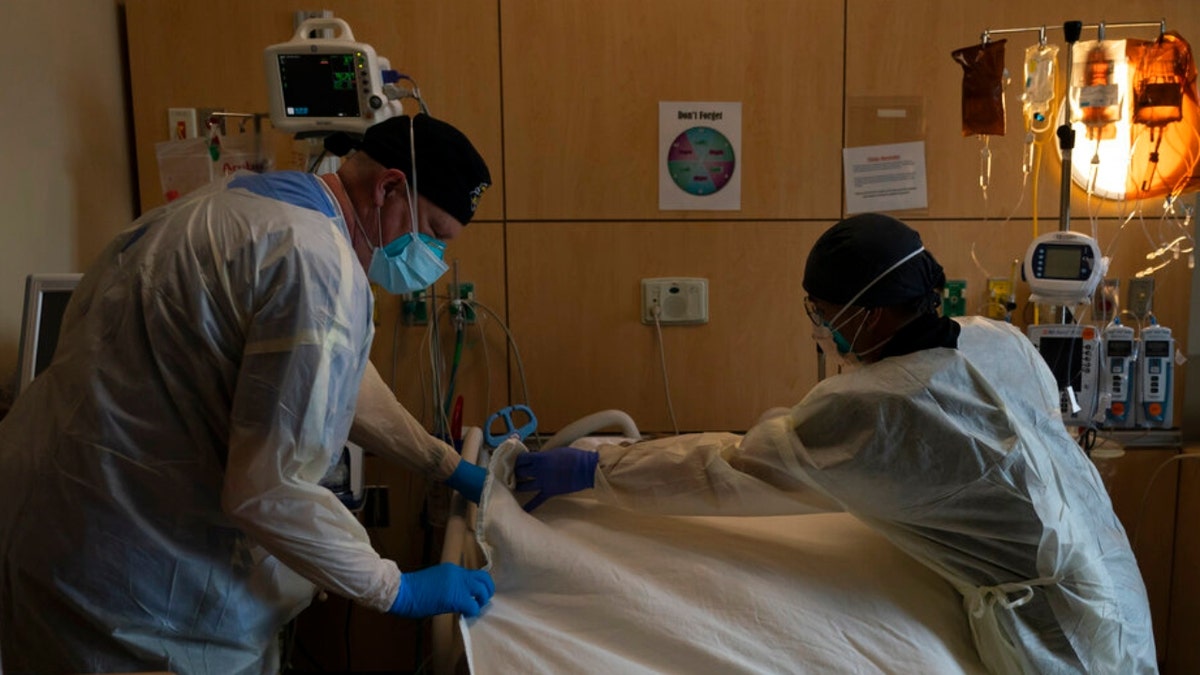Fox News Flash top headlines for January 26
Fox News Flash top headlines are here. Check out what's clicking on Foxnews.com.
Data from the Centers for Disease Control and Prevention (CDC) shows the omicron variant of the coronavirus now accounts for 99.9% of new COVID-19 cases.
The delta variant – which spiked last summer but was not as transmissible – now makes up just 0.1% of that number.
TWO STEALTH OMICRON COVID VARIANT BA.2 CASES REPORTED IN WASHINGTON STATE
According to data from the Johns Hopkins Coronavirus Resource Center, the U.S. saw 429,510 new cases in the past day and 2,911 new deaths.
While cases numbers are down from the variant of concern's peak in certain states earlier this month, deaths have reached the highest level since early last year.
Nevertheless, hospitalizations have started to decline – a trajectory health leaders hope is indicative of an oncoming, more manageable phase of the pandemic.

FILE - Respiratory therapist Frans Oudenaar, left, and registered nurse Bryan Hofilena cover a body of a COVID-19 patient with a sheet at Providence Holy Cross Medical Center in Los Angeles, Dec. 14, 2021. The fast-moving omicron variant may cause less severe disease on average, but COVID-19 deaths in the U.S. are climbing and modelers forecast 50,000 to 300,000 more Americans could die by the time the wave subsides in mid-March. (AP Photo/Jae C. Hong, File)
In the midst of reports of encouraging trends, food banks across the U.S. are experiencing a critical shortage of volunteers, the Red Cross has declared its first-ever national blood crisis and scientists and health officials are keeping their eyes on a COVID-19 sub-variant called BA.2.
The stealthy variant has been found in at least 40 countries and is harder to detect – though there is still much that remains unknown.
Since November, more than three dozen countries have uploaded nearly 15,000 genetic sequences of BA.2 to GISAID, a global platform for sharing coronavirus data.
As of Tuesday, nearly 100 of those sequenced cases came from the U.S.
BA.2 has about 20 mutations in the spike protein that studs the outside of the virus are shared with the original omicron.
However, there are also additional genetic changes and scientists are working to understand more about how it differs from omicron.
The World Health Organization says investigations of BA.2 "should be prioritized."
"As of 24.01.2022, the BA.2 descendent lineage, which differs from BA.1 in some of the mutations, including in the spike protein, is increasing in many countries. Investigations into the characteristics of BA.2, including immune escape properties and virulence, should be prioritized independently (and comparatively) to BA.1," the agency wrote on its website.
CLICK HERE TO GET THE FOX NEWS
With BA.2, medical professions advise taking the same precautions as with omicron: getting vaccinated and boosted, social distancing and staying home when sick and following public health guidance regarding wearing masks.
The Associated Press contributed to this report.






















